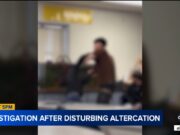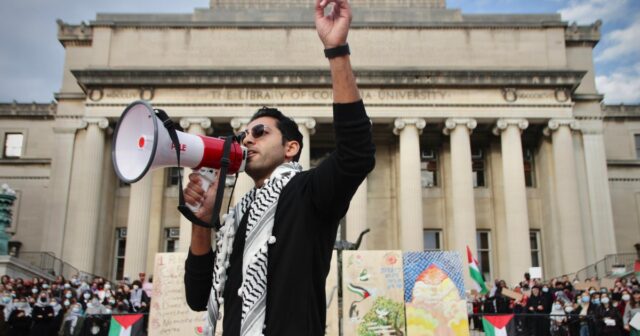
Watch CBS News
Ozturk co-authored an editorial in the Tufts’ student newspaper that criticized the school for its dismissal of several resolutions adopted by the undergraduate student senate as a “sincere effort to hold Israel accountable for clear violations of international law.” The editorial did not mention Hamas.
During Tuesday’s hearing, Esha Bhandari, an American Civil Liberties Union attorney representing Ozturk, said her client has been “held behind bars for six weeks while her health deteriorates for writing an op-ed.” All she is asking for is for the temporary transfer order to be completed as court proceedings play out in Vermont, Bhandari said.
“The executive branch made a specific decision to detain Ms. Ozturk because of her speech,” she said.
The Justice Department has argued in part that the district court in Vermont does not have jurisdiction over Ozturk’s habeas petition because it was not filed where she is confined — Louisiana — and did not name her immediate custodian as a defendant — the warden at the detention center.
But Bhandari argued that the executive branch effectively suspended the writ of habeas corpus on its own by refusing to specify to Ozturk’s lawyers who had custody of her, which would have allowed them to name that person as the defendant in Ozturk’s challenge to her detention.
Bhandari called the government’s position “breathtaking.”
According to court filings, a memorandum from a senior official with the State Department’s Bureau of Consular Affairs said Ozturk’s visa was revoked based on a request from ICE and the Department of Homeland Security, which determined that she “had been involved in associations that ‘may undermine U.S. foreign policy by creating a hostile environment for Jewish students and indicating support for a designated terrorist organization.'”
After she was arrested, Ozturk was transported to Methuen, Massachusetts, and transported to Lebanon, New Hampshire, followed by St. Albans, Vermont, where she was kept overnight. On the morning of March 26, in Burlington, Vermont, Ozturk was put on a plane and flown to Louisiana, where she is currently in custody at an immigration facility in Basile.
Ozturk’s lawyers filed a petition challenging her arrest and detention as a violation of the First and Fifth Amendments in federal district court in Massachusetts. But the case was transferred to Sessions’ court in Vermont after it was determined that Ozturk was detained in that state at the time the petition was filed.
The Justice Department sought to dismiss Ozturk’s petition while her lawyers asked Sessions to order her to be released or transferred to Vermont while her claims are adjudicated.
Sessions last month ruled that Ozturk’s arrest and detention raised “significant constitutional concerns” and said she must be transferred to ICE custody in Vermont by May 1. He also set a bail hearing for May 9, with Ozturk appearing in person, and will consider the merits of her habeas petition on May 22.
The 2nd Circuit temporarily paused Sessions’ order late last month while it considers the Trump administration’s request for emergency relief.
Mahdawi, who is to graduate from Columbia this month with a bachelor’s degree in philosophy, was detained by immigration agents in Vermont last month during what he was told was his citizenship interview.
He was born in the Israeli-occupied West Bank and he has held a green card for the last 10 years and co-founded his university’s Palestinian Student Union, alongside Mahmoud Khalil, a Palestinian activist, Columbia Ph.D. student and U.S. resident detained by the government. Mahdawi’s attorneys said he took a “step back” from the high-profile protests at the school before students began occupying university buildings.
Khalil, a Palestinian born in Syria, was a vocal member of last year’s protests at Columbia. He was arrested by ICE in March. He is also challenging his removal and detention, though an immigration judge allowed the government to proceed with its effort to deport Khalil.
In an interview with CBS News the day before his arrest, Mahdawi called the interview a “honey trap” that allowed federal immigration officials to detain him while he went in to pursue U.S. citizenship.
Mahdawi’s attorneys secured a court order that blocked the Trump administration from deporting him or moving him outside of Vermont. Then, last week, Crawford released Mahdawi from federal detention as his immigration proceedings continue and again barred the government from removing him from the state or country.
A U.S. attorney arguing against Mahdawi’s release said that keeping him in detention would be a “constitutionally valid aspect of the deportation process” and argued in court filings that Mahdawi’s “presence and activities” in the U.S. “have serious adverse foreign policy consequences” if he remains here.
But Naz Ahmad, who argued on Mahdawi’s behalf before the 2nd Circuit, told the judges that the government’s detention of her client was “retaliatory” and had not only chilled his speech, but also others. He is challenging his detention as a violation of the First and First Amendments.
If the 2nd Circuit grants the Justice Department’s request for the stay in Mahdawi’s case, it would allow immigration authorities to re-detain him. But two of the judges on the panel seemed to question how the government is harmed by the lower court’s decision ordering Mahdawi’s release.
Barrington asked Drew Ensign, a Justice Department lawyer, whether an “adverse” decision constitutes irreparable harm to the government. Irreparable harm is one of four factors courts analyze when considering whether to grant a stay of a lower court order.
Ensign mentioned operational costs to the government that would arise from Mahdawi having to participate in immigration proceedings, which are being held separately in Louisiana, from Vermont.
One of the judges noted that in both Mahdawi and Ozturk’s cases, the district court judges have indicated a “strong desire” to move quickly when considering the challenges to their allegedly unlawful detentions.
The Trump administration has been cracking down on U.S. universities and their students who were involved in pro-Palestinian protests waged after Hamas’ Oct. 7, 2023, terror attack on Israel, which triggered the war in the Gaza Strip.
President Trump signed an executive order in January that ordered his administration to use “all available and appropriate legal tools, to prosecute, remove, or otherwise hold to account the perpetrators of unlawful anti-Semitic harassment and violence.” The White House said that these efforts would include deporting alleged “Hamas sympathizers” and revoking student visas.
- In:
- Immigration
Melissa Quinn is a politics reporter for CBSNews.com. She has written for outlets including the Washington Examiner, Daily Signal and Alexandria Times. Melissa covers U.S. politics, with a focus on the Supreme Court and federal courts.


































